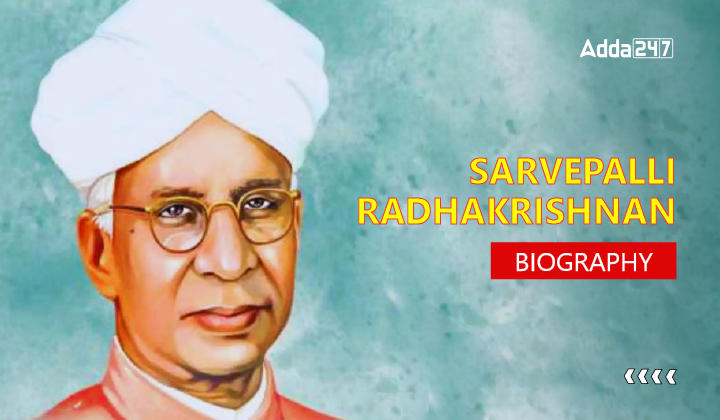Table of Contents
Sarvepalli Radhakrishnan was a profound scholar, philosopher, and teacher and eventually became the 2nd President of India. He was a remarkable figure who left an indelible mark on the realms of philosophy, education, and politics. Radhakrishnan’s life story is one of intellectual excellence, tireless dedication, and profound influence which is reflected in his scholarly achievements and unswerving commitment to the betterment of society.
Early Life and Education of Sarvepalli Radhakrishnan
Sarvepalli Radhakrishnan’s early life was rooted in the picturesque village of Thiruttani in Tamil Nadu, India, where he was born on 5 September 1888, to parents Sarvepalli Veeraswami and Sithamma. Growing up alongside his two siblings, his educational journey commenced at the K. V. High School in Thiruttani and continued at institutions like the Hermansburg Evangelical Lutheran Mission School in Tirupati and the Government High Secondary School in Walajapet, starting from 1896.
Following his First of Arts (F.A.) class, Radhakrishnan enrolled at the Madras Christian College, affiliated with the University of Madras, at the tender age of 16. He successfully graduated from this esteemed institution in 1907 and further solidified his academic proficiency by obtaining a Master’s degree in Philosophy from the same college.
Sarvepalli Radhakrishnan’s Academic Excellence
Sarvepalli Radhakrishnan had a distinguished academic career, starting as a philosophy lecturer at Madras Presidency College in 1909. He published articles in reputable journals and authored books, including “The Philosophy of Rabindranath Tagore” and “The Reign of Religion in Contemporary Philosophy.” He held academic positions at the University of Mysore, University of Calcutta, and University of Oxford, where he was the Spalding Professor of Eastern Religion and Ethics. Radhakrishnan’s contributions earned him a knighthood in 1931, and he served as the Vice-Chancellor of Banaras Hindu University from 1939 to 1948. His scholarly work garnered multiple Nobel Prize nominations in Literature.
Sarvepalli Radhakrishnan’s Contributions to Philosophy
Radhakrishnan’s philosophical contribution centred on bridging Eastern and Western thought, defending Hinduism against uninformed Western criticism while incorporating Western ideas. He championed Neo-Vedanta, reinterpreting Advaita Vedanta for contemporary understanding, emphasizing the coexistence of diverse human experiences with the absolute reality of Brahman.
He revised the notion of Maya as a subjective misperception, highlighting “intuition” as a source of unmediated knowledge. Radhakrishnan viewed theology and creeds as symbolic formulations of religious experience, ranking religions based on their grasp of “religious intuition,” with Advaita Vedanta at the pinnacle. His work facilitated cross-cultural philosophical dialogue.
Sarvepalli Radhakrishnan’s Role in Education
Radhakrishnan firmly believed in the transformative power of education. His service as Vice-Chancellor of Andhra University and Banaras Hindu University provided him with platforms to introduce substantial reforms in the Indian educational system. His vision was to create an inclusive and progressive education system accessible to all.
Sarvepalli Radhakrishnan in Politics
Radhakrishnan’s onset into politics came after India gained independence in 1947. He assumed the role of India’s Ambassador to the Soviet Union (1949-1952) before his election as India’s first Vice President in 1952. His tenure as Vice President marked the beginning of his illustrious political career.
The Philosopher-President
In 1962, Radhakrishnan reached the pinnacle of his political career when he was elected as the second President of India. During his presidency, he continued to champion the cause of education and cultural understanding. His decision to celebrate his birthday as Teacher’s Day reflects his deep appreciation for Teachers and their role in shaping the future of the nation.
Legacy and Impact of Sarvepalli Radhakrishnan
Sarvepalli Radhakrishnan passed away on 17 April 1975, but his legacy lived through generations. His works on philosophy, religion, and ethics remain influential and are studied worldwide. His commitment to education and his role in shaping India’s educational institutions continue to benefit generations of students. The celebration of Teacher’s Day on his birthday is a fitting tribute to his enduring legacy.



 West Bengal Teacher Recruitment 2025 Not...
West Bengal Teacher Recruitment 2025 Not...
 Rajasthan Librarian Grade 2 Final Result...
Rajasthan Librarian Grade 2 Final Result...
 MPPSC Assistant Professor Admit Card 202...
MPPSC Assistant Professor Admit Card 202...




